Introduction
Achieving Google Cloud Platform (GCP) certifications goes beyond enhancing your resume; it's a powerful tool for professional growth and recognition in the field of cloud expertise. These certifications validate your skills and proficiency with Google Cloud technologies, opening doors to new career opportunities and significantly impacting your earning potential. With a recent $3 billion investment in enhancing its data center campuses, Google's commitment to expanding its technical infrastructure highlights the growing demand for skilled professionals in this field.
GCP certifications offer a structured pathway for professionals at different career stages, from foundational to specialized levels, allowing them to demonstrate their continuous learning and passion for Google technology. By investing in GCP certifications, professionals can differentiate themselves in today's job market, align with international standards and best practices, and prove their readiness for job roles in cloud technology. In this article, we will explore the different types of GCP certifications, the costs associated with them, and the benefits they bring to professionals in the field.
Why Invest in GCP Certifications?
Obtaining Google Cloud Platform (GCP) credentials is more than just an enhancement to your resume; it's a potent instrument for career progress and acknowledgement of your cloud skills. These credentials serve as a confirmation of your abilities and a proof of your proficiency with technologies from the Cloud. With GCP credentials, individuals from various backgrounds—including developers, founders, and activists—can showcase their ongoing learning and enthusiasm for Google technology. These credentials can unlock doors to fresh job prospects and can greatly influence your income potential. In fact, according to Pearson VUE's 2023 Value of IT Certification candidate report, 81% of certification holders have seen an increase in work quality and value, highlighting the significance of certifications as a hallmark of expertise.
Furthermore, the dedication of the company known for its search engine to expanding its technical infrastructure, as demonstrated by a recent $3 billion investment to improve its data center campuses, highlights the increasing need for skilled individuals in this industry. The Developer Experts (GDE) program further exemplifies this point by showcasing a community where professionals passionate about technology can share knowledge and make a substantial impact. Eligibility for the GDE program does not require formal education, but it does require a solid expertise in Google technologies and significant contributions to the developer community.
To lead you through the top cloud credentials for 2024, take into account that the appropriate credential can distinguish you in a job market that is progressively appreciating cybersecurity proficiency. A Center of Excellence (CoE) supports the notion that people, technology, and processes form the pillars of a successful platform. This principle is particularly relevant when implementing a Cloud Center of Excellence (CCoE), which is critical for ensuring effective governance in areas like security, compliance, and cost management. Ultimately, investing in GCP credentials is investing in your ability to stand out and prove that your skills are job-ready—a strategic investment in your career trajectory.
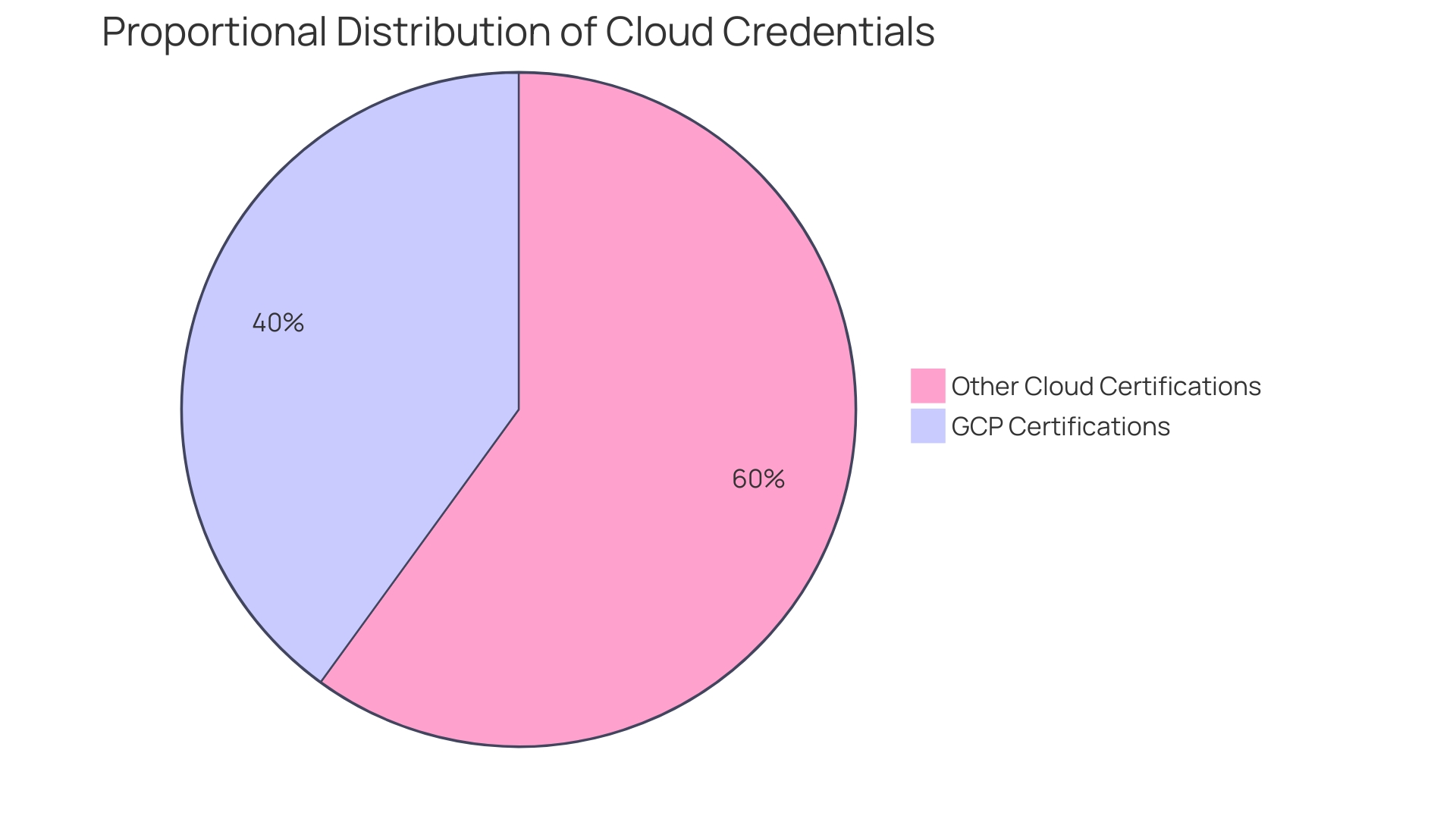
Types of GCP Certifications
GCP credentials provide a structured pathway for experts to showcase their proficiency in Cloud technology from the search giant. These qualifications are categorized into foundational, associate, and specialized, each intended to validate skills at various points in one's career. Experts can begin with foundational credentials to demonstrate their fundamental cloud understanding, then advance to associate or expert tiers that showcase their specialized expertise in designing, strategizing, overseeing, and constructing on Google Cloud's platform. Specialized credentials, on the other hand, are designed for those seeking to showcase advanced skills and knowledge in specific areas like machine learning or data engineering.
The importance of these credentials lies in their ability to validate an individual's dedication to ongoing education and their capacity to make meaningful contributions within their organizations and the broader community. They serve as evidence of a person's expertise in Google Cloud technologies, which is increasingly important in today's digital-first world. By obtaining these credentials, individuals can distinguish themselves in the employment market, potentially unlocking increased pay and enhanced career prospects in the field of cloud technology. Furthermore, credentials like these are vital for professionals who aspire to conform with global standards and optimal approaches, as backed by the Common Criteria Recognition for Information Technology Security Evaluation.
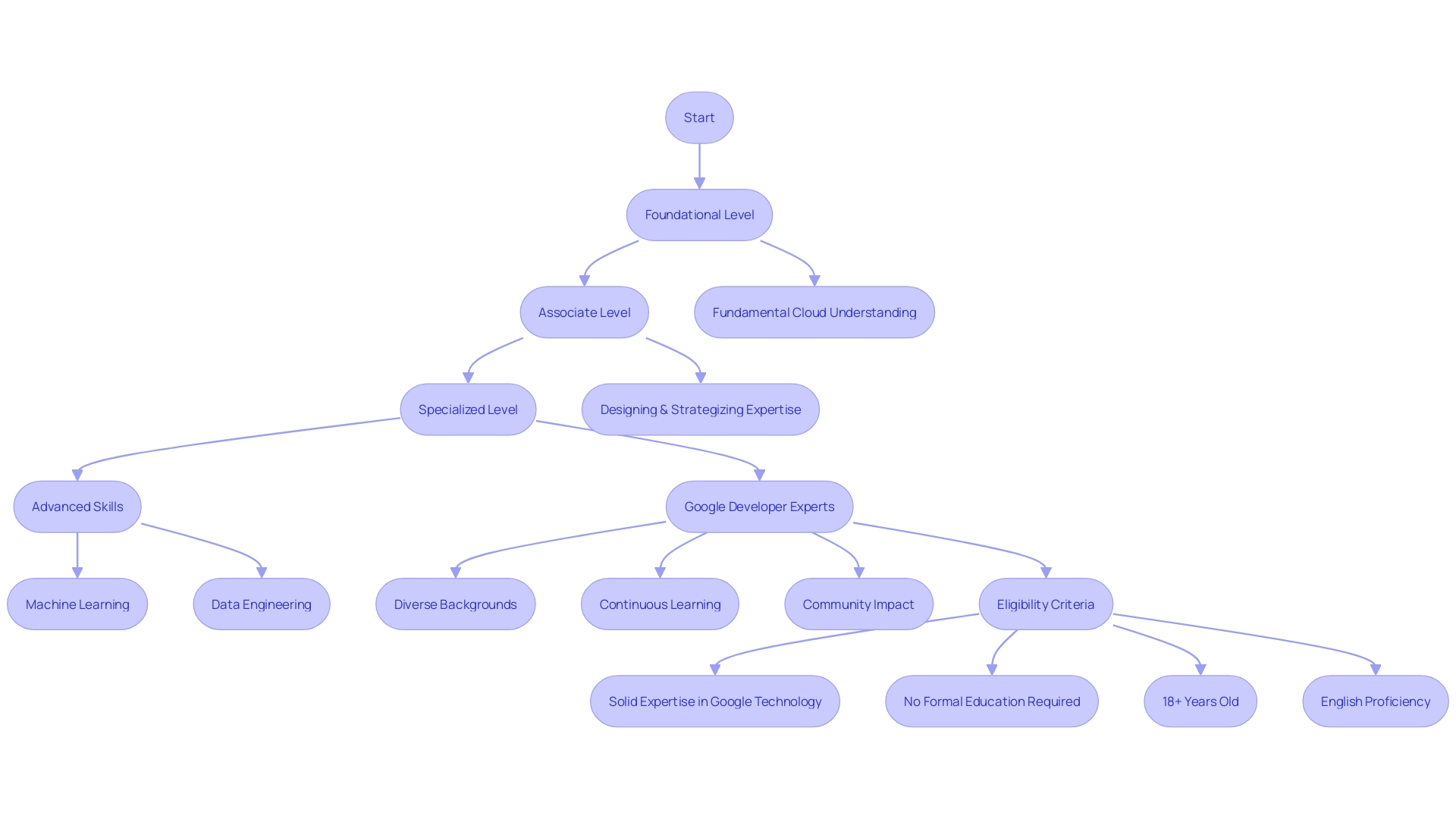
Costs of GCP Certifications
As the domain of cloud computing expands, the importance of credentials in this area has never been more evident. Not only do they serve as a tangible validation of one's skills, but they also play a crucial role in career advancement. For those seeking to validate their expertise in Google Cloud Platform (GCP) technologies, navigating the financial aspect of becoming certified is crucial.
GCP credentials are organized into different tiers, each with its own price point, reflecting the extent and scope of knowledge and skills being evaluated. Putting your resources into these credentials isn't only a financial commitment; it's a milestone towards joining a distinguished community of experts. Developer Experts (GDE), for example, are a testament to the diversity and passion in the field—ranging from developers to activists, all sharing a common drive for continuous learning and community contribution.
Becoming part of GDEs or acquiring other GCP credentials doesn't necessitate formal education, but it does require a commitment to becoming proficient in technologies offered by Google and a readiness to exchange knowledge and experiences with others. As emphasized by an experienced data expert's transition from open-source data systems to a GCP-focused structure, the path to validation is frequently characterized by conquering obstacles and promoting enhancements in parallel with Google's product development.
The pursuit of GCP credentials is an indication of a larger trend where demand for data scientists is projected to skyrocket, as reported by the U.S. Bureau of Labor Statistics. In an increasingly data-driven world, with data analytics roles becoming more and more important in all industries, having knowledge and expertise in cloud technologies like GCP is not only advantageous, but also essential for those who aspire to be at the forefront.
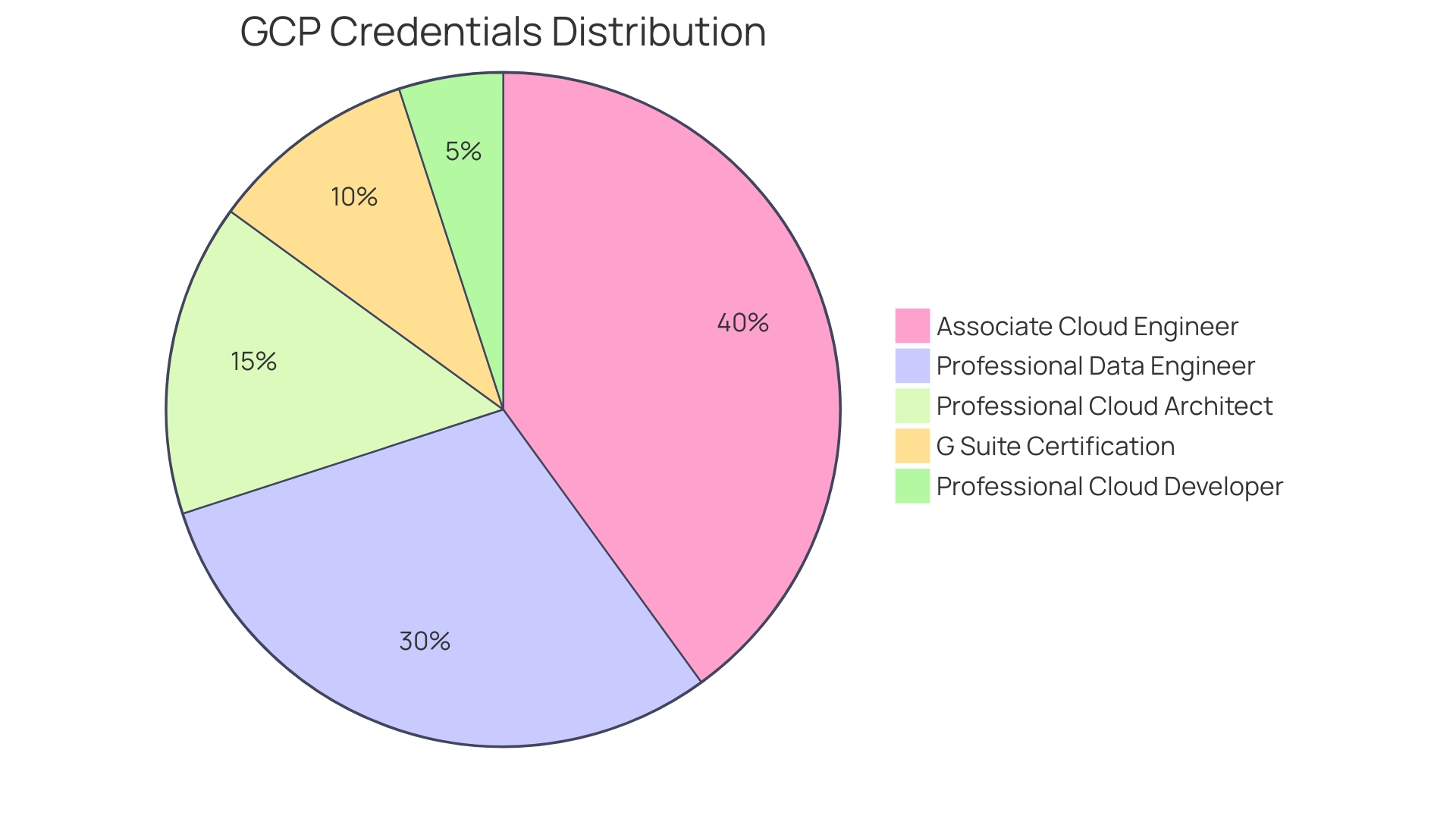
Google Cloud Certification Levels
Google Cloud Platform (GCP) credentials are a necessary resource for individuals to validate their cloud expertise and showcase their capability to utilize GCP to organizations. These credentials are organized into different tiers: basic, intermediate, and expert. Each tier is designed to certify a different degree of expertise and skills in cloud computing. The foundational level is intended for individuals who are new to cloud computing and wish to understand the basics. The associate level is targeted at those with some experience in GCP and who are looking to validate their foundational skills. Ultimately, the expert level is for cloud specialists who possess significant experience and want to certify their advanced technical skills and knowledge.
Advancement in the cloud computing industry is increasingly linked to these credentials, as they demonstrate a strong dedication to career progression and are highly respected by employers. Actually, credentials can be a crucial element in job preparedness and can enhance practical knowledge, enhancing a person's qualifications in the perspective of potential employers. With cloud adoption on the rise, professionals who can show both practical experience and formal recognition are well-positioned for career advancement in this rapidly evolving digital landscape.
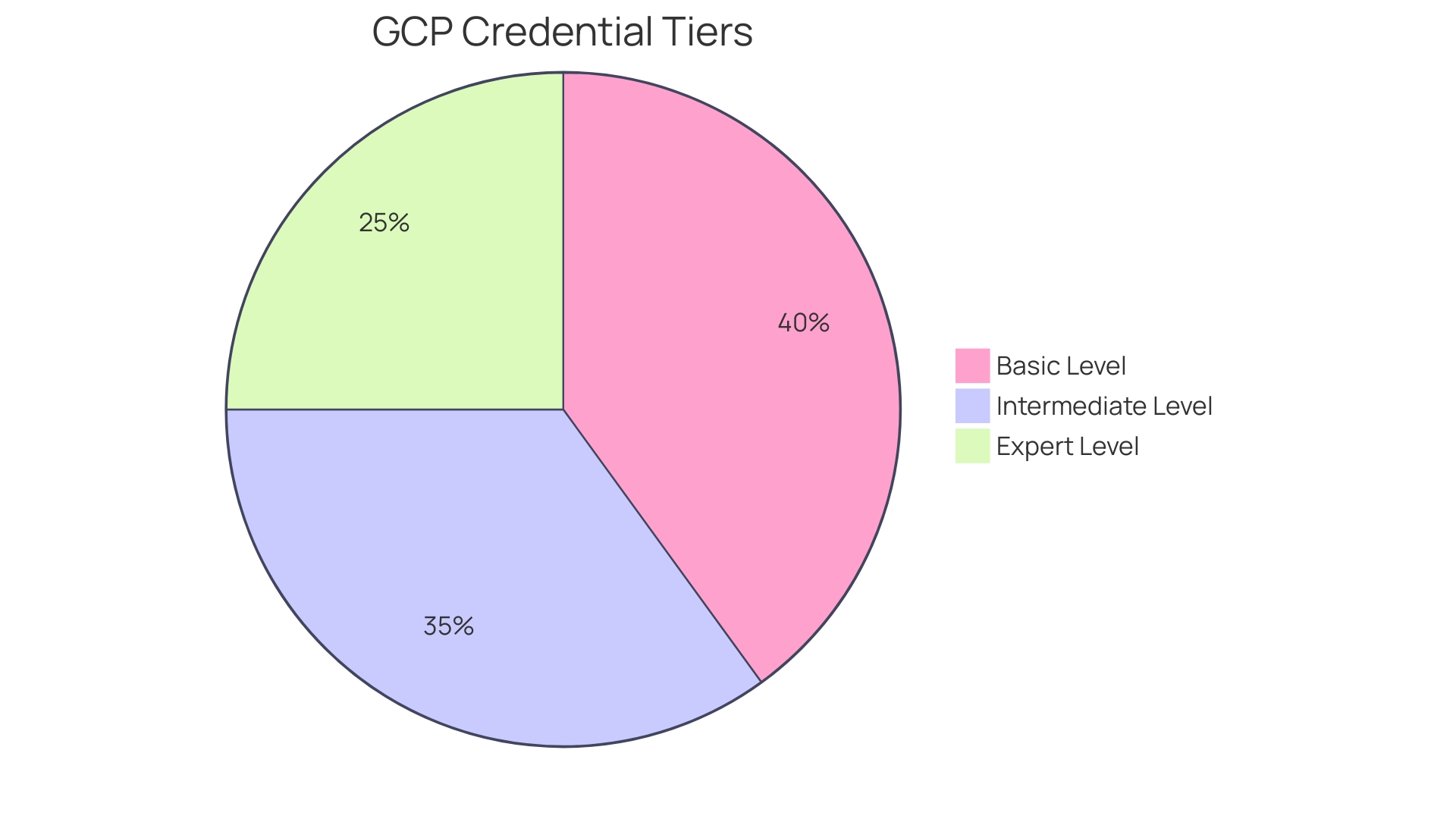
Foundational Certifications
Entry-level GCP credentials provide a practical gateway for individuals aiming to establish their understanding of key Google Cloud Platform (GCP) concepts and services. Acknowledged as the fundamental level, these credentials serve as a priceless starting point for beginners in the domain, guaranteeing they have a strong understanding of crucial GCP components without requiring a substantial monetary commitment.
The intrinsic value of these certifications is exemplified by the diverse array of professionals who have leveraged them to advance their careers. Developer Experts, for instance, come from a multitude of backgrounds, such as developers, entrepreneurs, and activists. Their shared factor is a strong knowledge in technologies from a well-known search engine, a passionate devotion to continuous education, and a commitment to exchanging information within the community. Importantly, having a formal education is not required for the Google Developer Expert program, emphasizing the inclusive and easily accessible nature of GCP foundational credentials.
Moreover, the learning opportunities do not end with certification. Events like Cloud Next '24 provide a rich environment for ongoing personal growth. With hundreds of sessions, hands-on training, and direct engagement with Google engineers, these events underscore the dynamic, ever-evolving landscape of cloud technology and AI.
In the rapidly evolving realm of cloud computing, certifications act as a beacon, signaling an individual's current and relevant expertise. The significance of this is reflected in the worldwide recognition of credentials, with studies demonstrating their favorable influence on the earnings of IT experts as a result of the strong need for cybersecurity and cloud computing expertise.
The GitHub Foundations program is a notable example of such a initiative that has recently broadened its accessibility. Initially exclusive to employees and partners, it is now open to the wider customer base, offering insights into GitHub's fundamental concepts and products. This action represents a pattern where credentials are more and more regarded as necessary instruments for individuals aiming to confirm their expertise and understanding in a competitive employment industry.
In the end, GCP foundational credentials are more than just an educational accomplishment; they are evidence of a person's commitment to their work and their readiness to face the obstacles of a digital-first future.
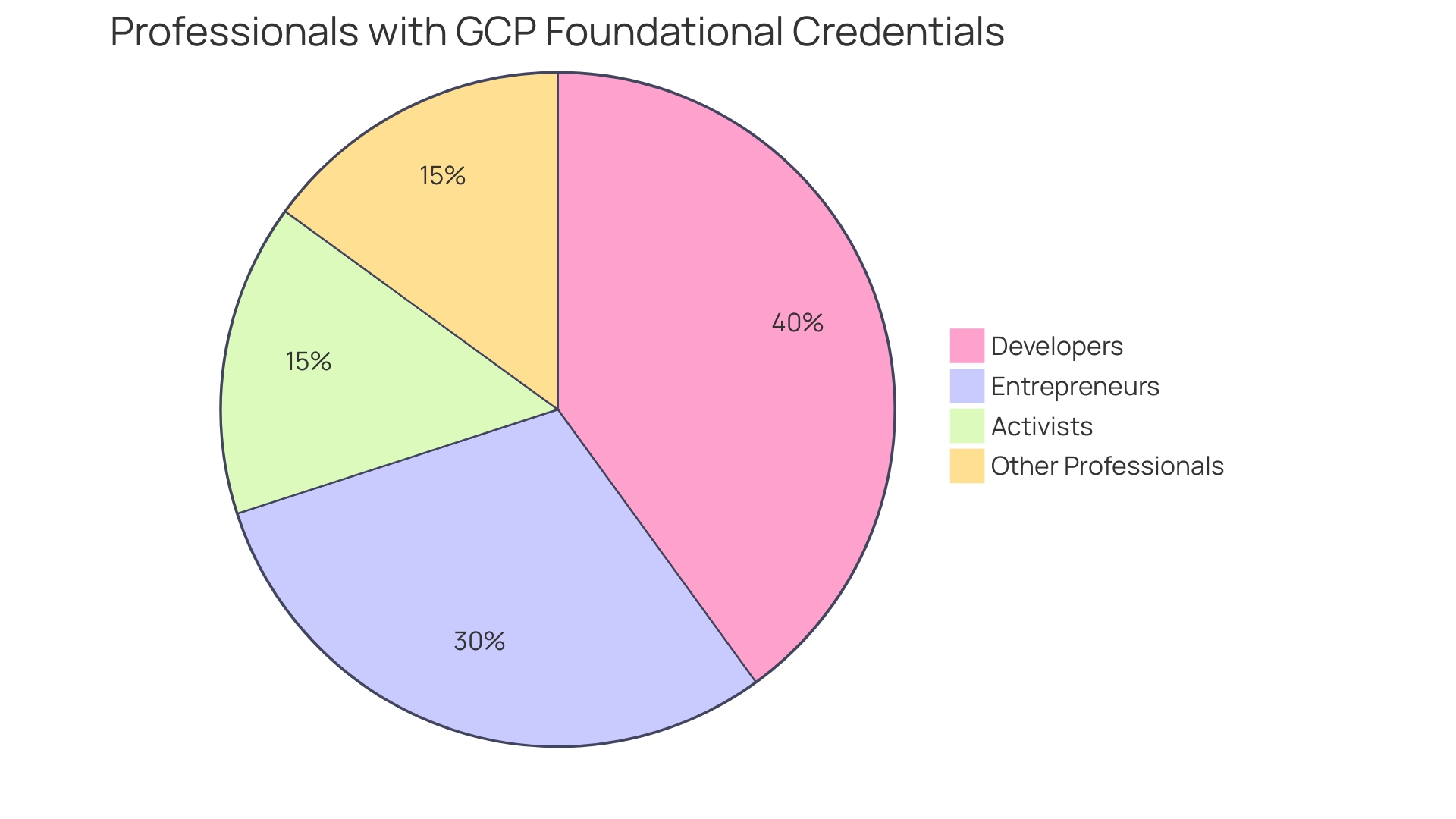
Associate Certifications
Experienced individuals who are skilled in implementing and overseeing GCP solutions can enhance their expertise with associate qualifications. Unlike basic credentials, these associate levels are a step up both in terms of skill requirement and investment. They are meticulously crafted for those who aspire to showcase their prowess in cloud architecture and data management. A quintessential example of the practical application of these skills can be seen in the gaming industry, where real-time data analysis is vital for creating dynamic, player-centric experiences.
Moreover, in industries such as real estate, where the shift from paper-based to cloud-enabled procedures is still a work in development, associate credentials act as a guiding light for professionals who desire to streamline operations through standardized cloud solutions. The credentials are also crucial for data engineers, who are the backbone of data-driven decision-making in any tech-savvy business. With expertise in programming, mathematics, and big data, they automate pipelines and manage large datasets, skills that are refined and confirmed through these credentials.
The architecture solutions that associate credentials prepare you for are not just theoretical. They are aligned with industry needs, such as designing data lakes and developing ingestion pipelines on a popular cloud platform, which are essential in building scalable recommendation engines and ensuring data integrity despite structural changes. The certifications also help ensure that your skills are up to date with the latest industry standards and practices, as reflected in the rigorous exam guidelines that demand a thorough understanding of cloud-based tools and technologies.
As we progress towards a more sustainable future, Carbon Sense suite by the tech giant is another area where associate-level expertise comes into play. By mastering the technology to track and improve carbon emissions, certified professionals can contribute to a greener planet while enhancing system performance.
The importance of these credentials is echoed by individuals like Jaquayvius, who transitioned from retail to the technology industry, gaining immediate job market relevance with the IT Support Certificate provided by the company. This story demonstrates the concrete career advancements facilitated by such credentials, further supported by statistics from Grow with a well-known search engine's initiative, which emphasizes the importance of continuous learning and the significant role of data analytics in today's workforce.
Associate credentials are therefore not only an affirmation of one's technical skills but also a doorway to advancement in one's career and a supporter of the technological advancement of different industries.
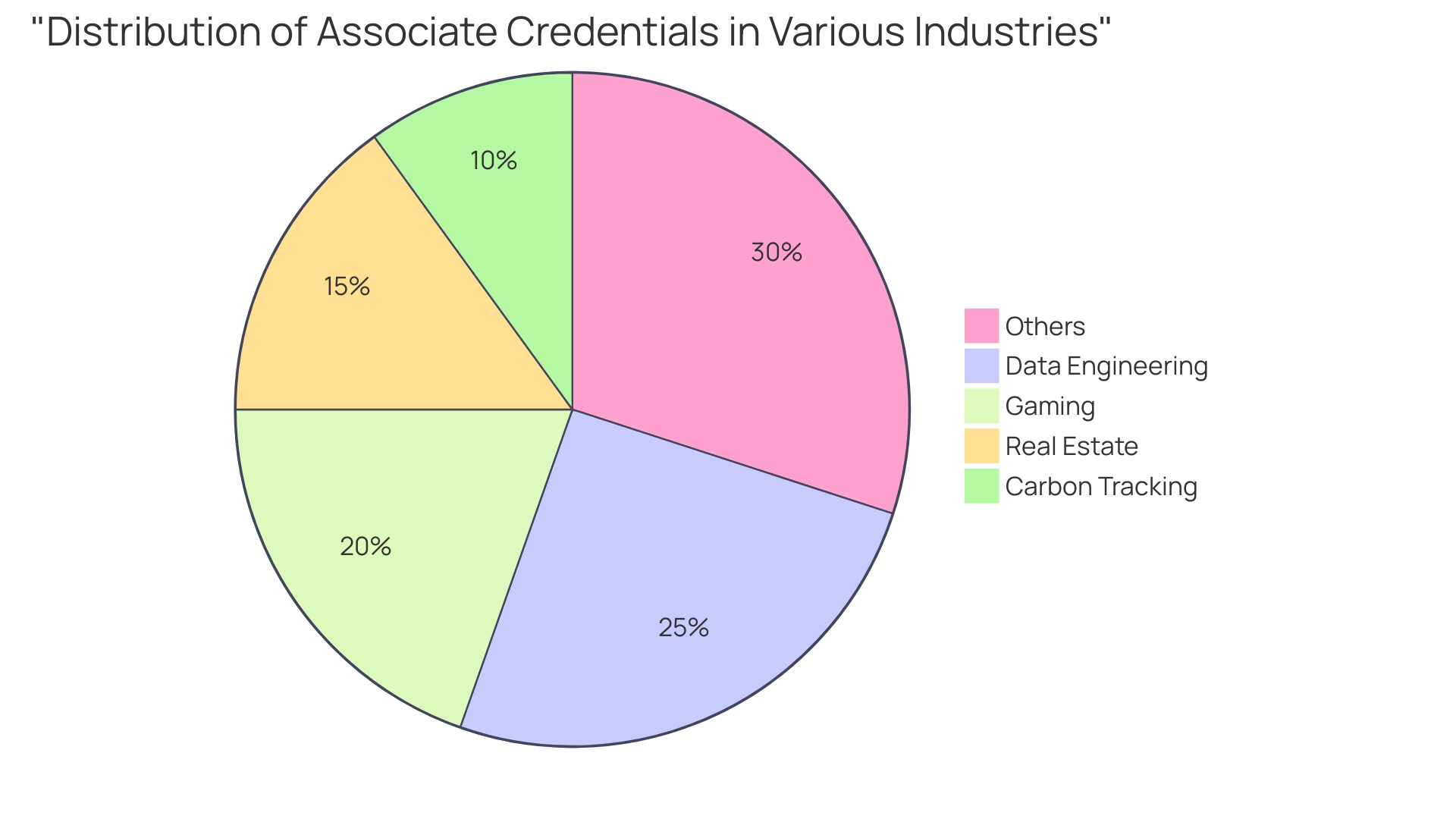
Professional Certifications
Achieving a recognized qualification in Google Cloud Platform (GCP) is a significant achievement for any technology expert seeking to validate their capability to design, develop, and oversee complex cloud solutions. However, the path to such credentials is accompanied by a financial consideration, with certifications usually commanding the highest investment among various tiers of credentials. These credentials are not only an expense but an investment in one's capability to navigate the intricacies of GCP architecture and services, a vital competency as cloud adoption soars. In the era of cloud computing, where concepts like IaaS, PaaS, SaaS, and serverless computing are fundamental, obtaining a recognized proof of one's skills and expertise serves as a tangible evidence.
These credentials cover a wide array of subjects, from comprehending the complexities of data analytics and its crucial part in decision-making to becoming an expert in the creation of resilient, scalable cloud infrastructures. For instance, businesses are increasingly reliant on data analysts to interpret vast quantities of data, ensuring that their services and products are strategically aligned with market demands. As cloud technologies advance, so do the programs that ensure individuals have the required skills to succeed in an industry increasingly influenced by AI and emerging technologies. Furthermore, the pricing models for these credentials demonstrate a profound comprehension of consumption-based cost structures, with the actual cost reflecting not only the listed price but also any negotiated discounts, highlighting the significance of understanding cloud pricing models to optimize expenditure. With the landscape of professionals demanding a blend of hands-on experience and formal qualifications, GCP certifications stand as a beacon for those aiming to prove their job readiness to potential employers while contributing to a robust cybersecurity workforce.
Specializations
Beyond the foundational, associate, and expert tiers, Google Cloud's specialized credentials delve into specific technology areas, enhancing your expertise in niche GCP services. These certifications are designed for professionals with a passion for technologies from the company who are committed to continuous learning, sharing their knowledge, and making significant contributions to the community.
Developer Experts, for example, come from a diverse array of backgrounds, including developers and activists, and are not restricted by formal education requirements. Their common characteristic is a deep knowledge in areas like Android, Cloud Computing, Machine Learning, and Web technologies. By engaging with these accreditations, you can follow in the footsteps of industry peers who have transitioned to sophisticated data architectures using tools like BigQuery, Firebase, and Looker Studio, overcoming challenges with the help of a certain company's product iterations.
Moreover, Google Cloud Platform (GCP) is recognized for its broad and comprehensive portfolio, which caters to businesses needing everything from infrastructure management to cutting-edge AI and machine learning capabilities. The GCP validations authenticate your abilities and understanding in these fields, equipping you with the insight to make informed decisions about cloud deployment models—be it public, private, or hybrid—and service models such as IaaS, PaaS, SaaS, or serverless computing.
As pricing models for cloud services evolve, understanding the distinction between list price and contracted/custom price becomes crucial. The list price is the base rate for a product or service, inclusive of any basic discounts, whereas the contracted price is tailored to your organization, integrating negotiated discounts and credits. These specialized credentials not only contribute to personal growth but also have the potential to influence your career path positively, as shown by statistics highlighting increased salary prospects for certified experts in cybersecurity and cloud computing fields.
Preparation and Study Materials
Earning a Google Cloud Professional (GCP) credential demonstrates an individual's proficiency in cloud architecture, management, and security. It requires a thorough comprehension of concepts such as infrastructure as code, which allows experts to automate and manage cloud resources with precision and efficiency. Through scripting, developers can deploy and scale infrastructure in response to varying loads, reusing code and benefiting from version control for improved traceability and accountability.
To prepare for GCP exams, aspirants should utilize various resources, such as the Exam AZ-204 study guide, which provides a comprehensive overview of exam expectations, covering key topics and offering links to additional materials. It's important to review the skills measured and understand the exam's scope, as it may evolve over time.
Certified individuals are highly valued in the IT industry for their advanced skill set, making them more competitive in the job market. Companies look for certified experts for their verified skills in data analysis, machine learning, and predictive modeling, which are crucial in positions like data science and advanced data analysis.
Getting ready for such credentials involves an expense, which encompasses not just the time and effort dedicated to studying but also any costs associated with study materials and training programs. However, the investment is justified by the significant advantage it provides in professional development and marketability. By focusing on these areas, individuals can efficiently prepare for GCP exams and advance their careers in cloud computing and data management.
Exam Format and Duration
Obtaining a Google Cloud Platform (GCP) credential not only confirms one's proficiency in the cloud field but also gives a competitive advantage in the industry. With companies increasingly seeking certified individuals, comprehending the GCP exam's framework and time allocation is crucial. The exam format is meticulously designed to assess a candidate's proficiency across a spectrum of GCP services and solutions. It encompasses a variety of question types that cover theoretical knowledge and practical scenarios, ensuring a comprehensive evaluation of skills. The duration of the exam is another critical aspect to consider, as it requires efficient time management to navigate through the questions effectively. By familiarizing oneself with the exam's structure and timing, candidates can devise a strategic study plan, leveraging resources like study guides, which outline the topics and offer additional resources. This preparation is based on the principle that learning and obtaining credentials are more than just methods to improve job performance; they symbolize a dedication to ongoing growth and skill development in the ever-changing field of cloud technology.
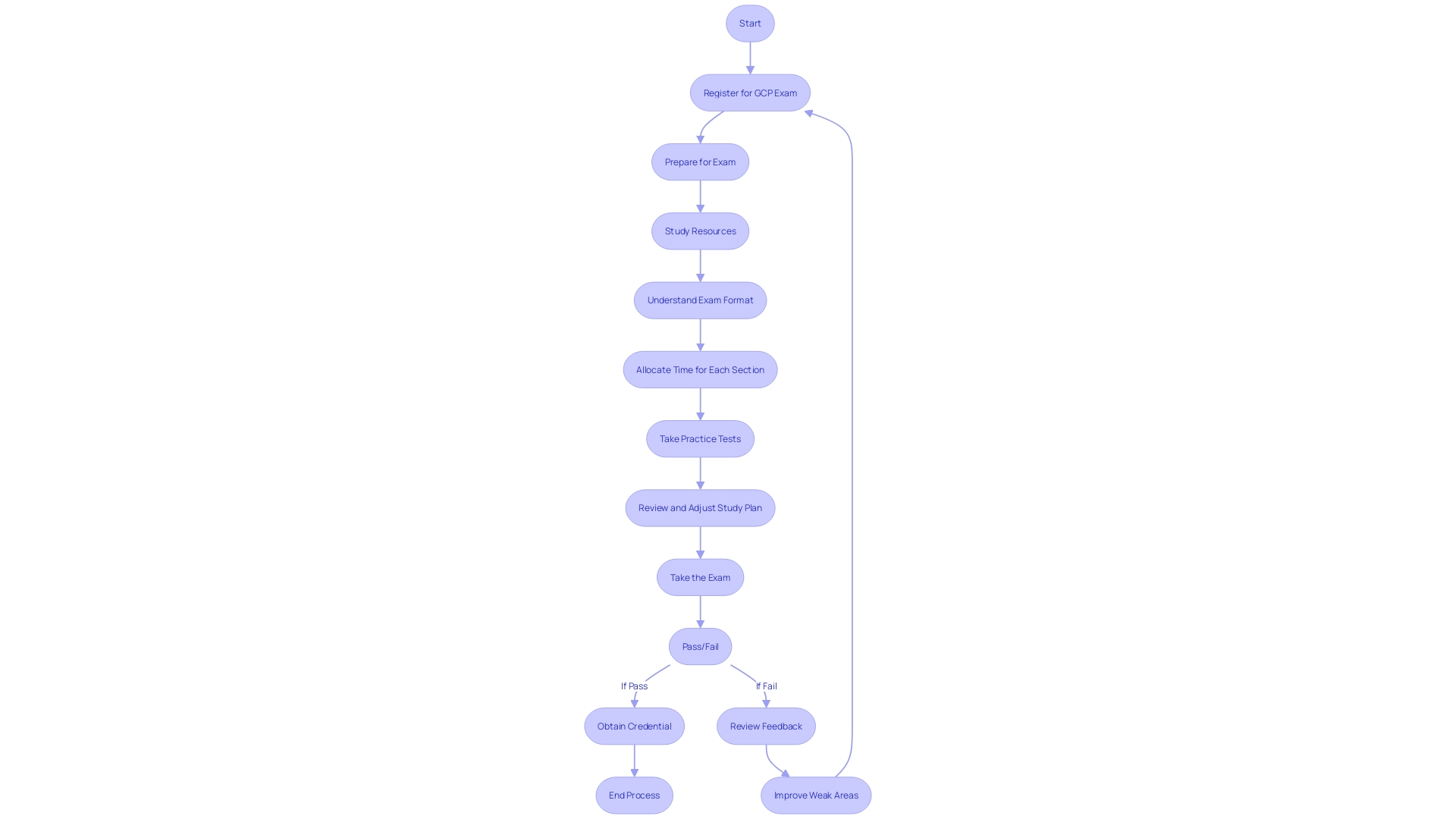
Certification Validity and Renewal
Keeping current GCP credentials is essential for professionals working with Google Cloud technologies. These credentials, which serve as evidence of one's skills and knowledge, need to be updated periodically to stay relevant. It is important to understand the process and requirements for keeping these certifications current, as well as the associated costs. Google Developer Experts, for instance, come from various walks of life, sharing a common passion for continuous learning and community impact through their expertise in Google technologies, including GCP. As the industry evolves, experts must stay informed about the latest innovations in cloud services and infrastructure, such as the broad and comprehensive offerings of GCP, including artificial intelligence, machine learning, and analytics, to name a few. This approach not only validates a person's dedication to their field but also aligns with the rapid pace of technological advancement and the global accessibility of cloud services. By maintaining their GCP credentials, individuals demonstrate their continuous commitment to personal growth and their capacity to make a substantial impact on the developer community and beyond.
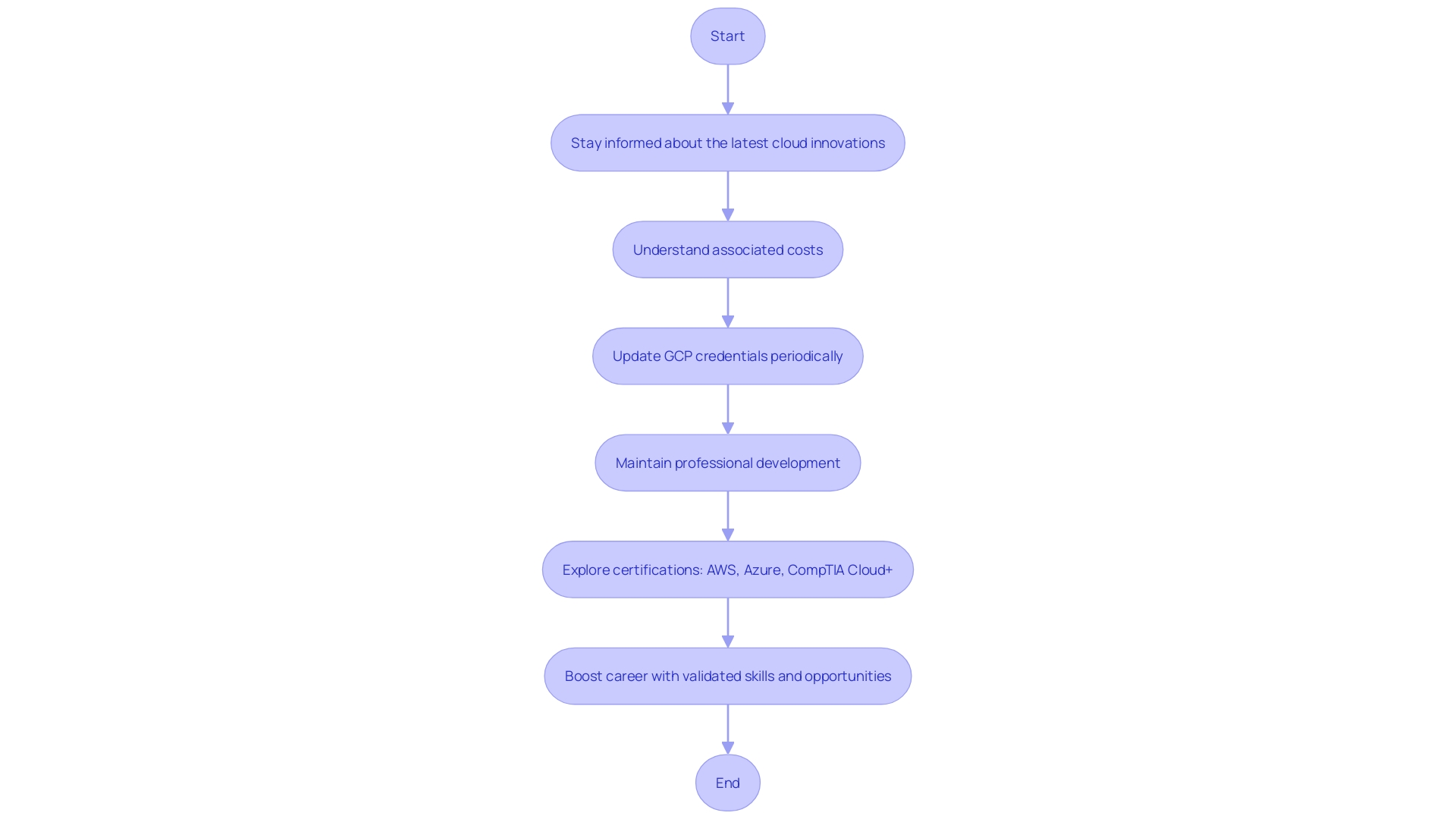
Benefits of GCP Certifications
Obtaining credentials in Google Cloud Platform (GCP) is not just about personal satisfaction; it signifies a strategic investment in one's career arsenal. For example, M&T Bank, with its deep-seated history and commitment to innovation, faced the formidable task of instituting Clean Code standards to enhance software maintainability and performance. GCP credentials could provide their teams with the skills needed to meet such high-quality standards and adhere to the strict regulatory requirements of the banking industry. Similarly, in Japan's real estate market, companies like Visual Research are revolutionizing the industry by digitizing processes heavily reliant on manual tasks. GCP credentials could be crucial in supporting such transformative efforts by providing professionals with the knowledge to implement and manage effective cloud solutions that streamline operations.
The benefits of GCP certifications are manifold and extend beyond the tech sphere. For individuals like Jaquayvius, Google Career Certificates and courses such as AI Essentials have paved the way to fulfilling careers, leveraging the skills acquired to secure positions that capitalize on the burgeoning demand for IT and cloud expertise.
Amidst the rapid technological evolution, cloud computing has emerged as a critical area of growth. As businesses shift to cloud infrastructures, the need for skilled professionals in this domain surges. Certifications serve as a testament to an individual's proficiency, with machine learning being one of the most sought-after skills. Acquiring a GCP credential can distinguish you in the job market, validate your expertise in high-demand areas, and open doors to career advancement opportunities.
A Center of Excellence (CoE), as described by industry experts, rests on the pillars of people, technology, and processes. GCP certifications contribute to fortifying these pillars, particularly by enhancing the 'people' aspect through skill development, thereby facilitating the CoE's mission to foster a culture of innovation and efficiency.
To summarize, GCP certifications are a significant milestone towards not only demonstrating one's technical expertise but also supporting the strategic objectives of businesses across various sectors. The certifications embody a commitment to high standards, continuous learning, and an innovative spirit that resonate with the demands of today's dynamic business environment.
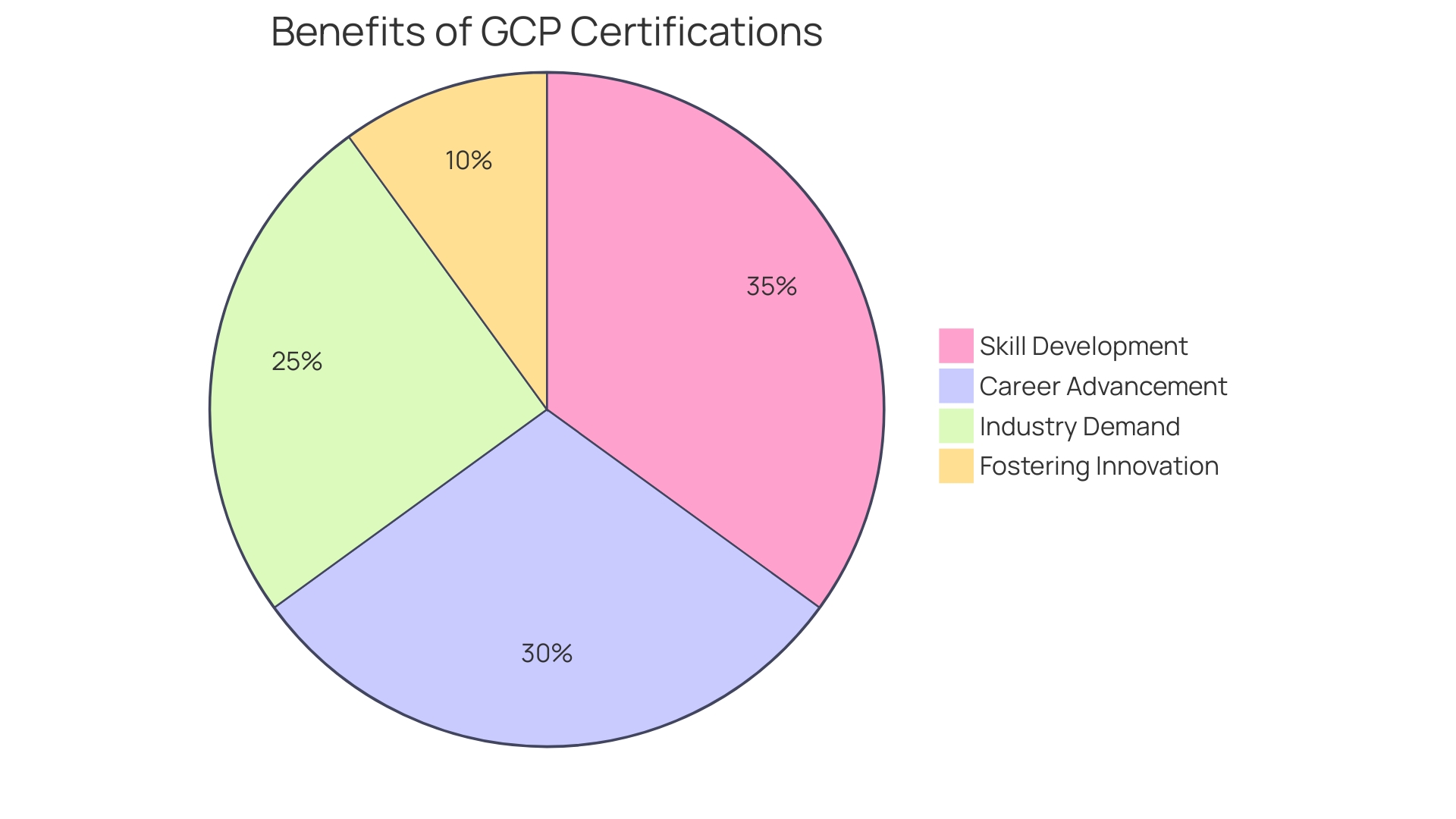
Conclusion
In conclusion, GCP certifications validate skills and proficiency with Google Cloud technologies, opening doors to new career opportunities and impacting earning potential. These certifications offer a structured pathway for professionals at different career stages, demonstrating continuous learning and passion for Google technology.
While there is a financial investment involved, GCP certifications are an essential tool for professionals seeking to validate their skills and knowledge in a competitive job market. They provide a tangible validation of abilities and contribute to career progression and marketability.
By earning GCP certifications, professionals demonstrate dedication to their craft and preparedness for the challenges of a digital-first future. These certifications serve as a testament to their commitment to continuous learning and ability to contribute to the developer community and beyond.
In conclusion, GCP certifications are a strategic investment. They validate expertise, open doors to new opportunities, and contribute to the goals of businesses across industries. By earning GCP certifications, professionals differentiate themselves in the job market and demonstrate readiness for the evolving demands of cloud technology.




